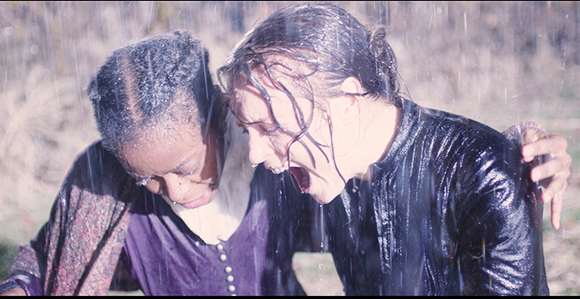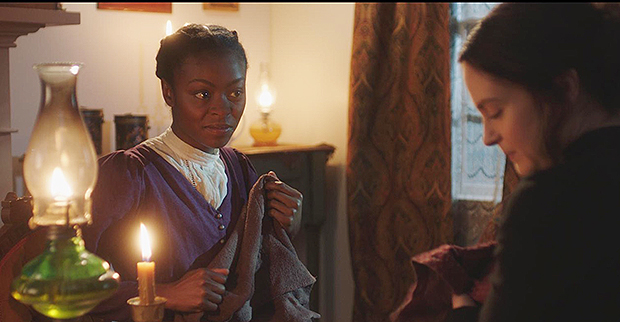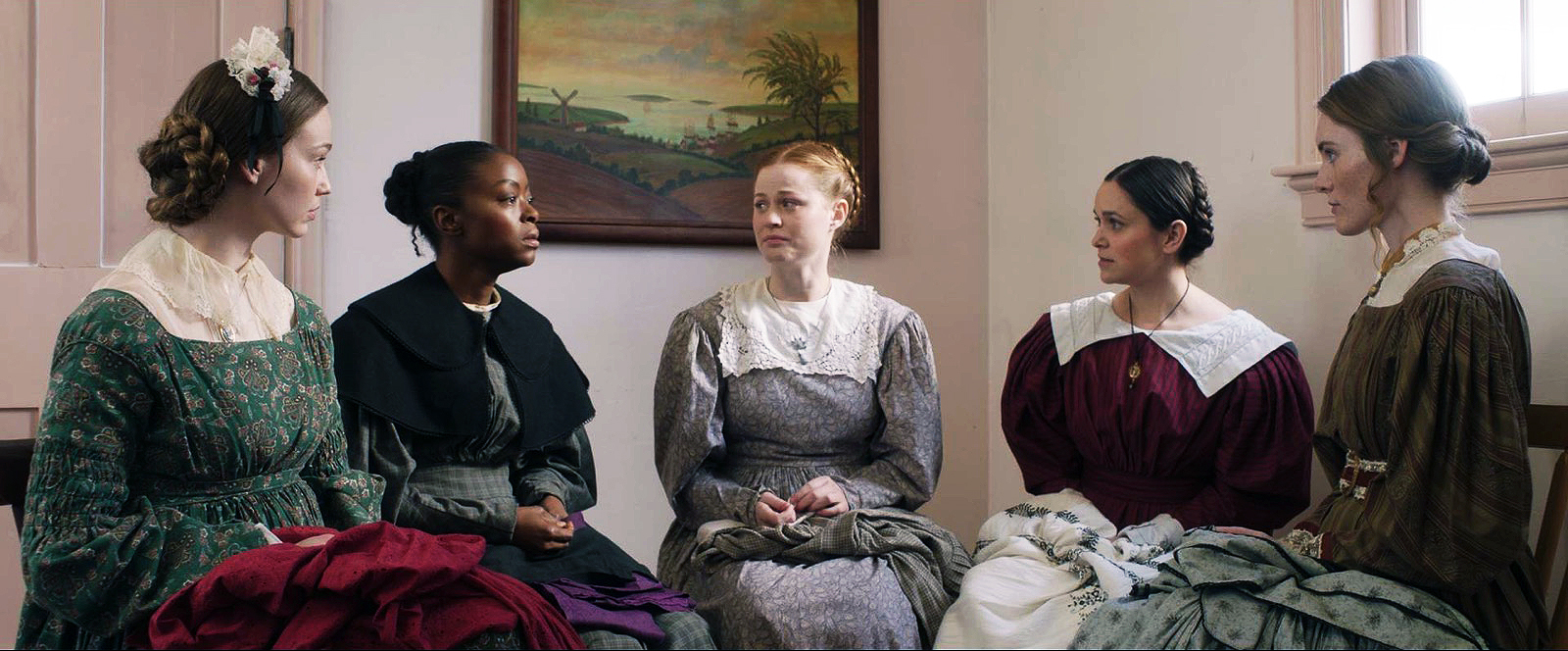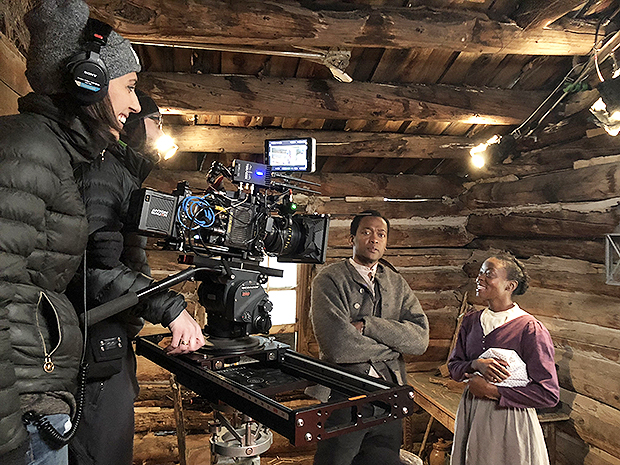“Jane and Emma” Film Examines Power of Unlikely Friendships
Contributed By Aubrey Eyre, Church News staff writer

Actresses Danielle Deadwyler, who plays Jane Manning James, and Emily Goss, who plays Emma Smith, in "Jane and Emma." Photo courtesy of Excel Entertainment.
"I hope people think about the friends they have around them and think about how we are following in the legacy of Jane and Emma.” —Tamu Smith, film producer
Imagine walking more than 700 miles with blistered and bleeding feet to reach a destination after being denied passage on a boat that would go directly there.
Imagine receiving glares from passersby and getting turned away from shops with food and other necessities.
Imagine prayerfully calling on God for a blessing of healing to be able to continue the journey when all hope feels lost.
Then imagine knocking on the door of a large house, hoping and praying that the people behind the door will be different from all the others along the way.
When the door opens, a woman with a bright face smiles, says, “Welcome, sister,” and lovingly receives you into her home as if you were her own flesh and blood returned home after a long absence.
Such was the beginning of the “unlikely friendship” and sisterhood of Jane Manning James and Emma Smith as detailed in the new film Jane and Emma.

Actresses Danielle Deadwyler, who plays Jane Manning James, and Emily Goss, who plays Emma Smith, in Jane and Emma. Photo courtesy of Excel Entertainment.
Jane and Emma in the spotlight
Although their life experiences were vastly different, Jane and Emma were two women connected as sisters through their faith in Christ. Jane was a free black woman who found strength and purpose in joining the Church. Emma was the first wife of the Church’s founding prophet in the modern day.
While the film blends fact with educated fiction, Melissa Leilani Larson, the film’s writer, explained in a recent Church News interview that, due to the limited records detailing the history and relationship of the two women, the film’s creative team opted to allow the characters to grapple with factual tensions in as real of a way imaginable.
With Jane and Emma’s relationship as the focal point, the film naturally addresses some of the more difficult topics in Church history.
Jane and Emma takes a faithful and inspirational approach “to some of the more difficult topics,” said Arthur Van Wagenen, CEO of Excel Entertainment. “That’s what I think is unique about it.”
It’s also unique for a film centered on Church history to have two women as the main protagonists.
“I think we’re seeing a version of Emma Smith on screen that we’ve never seen before.” Van Wagenen said. “That might be jarring for some, because of the strength that she exhibits in the film.”
Women ahead of their time

On the set of Jane and Emma.
The topics covered in the film open new avenues of understanding for what the Church was like during its early years and the roles and influence that women held. By doing so, the film gets at the spiritual truth of the relationship between two women who, despite all that separated them, wanted to be sisters for eternity, Van Wagenen explained.
Together, Jane and Emma pioneered positive examples of how people should treat one another, explained Zandra Vranes and Tamu Smith, cofounders of Sistas in Zion and producers of the new film.
“All of the things that we struggle to do in 2018, they were somehow doing in 1843,” Vranes said, noting how the two women balanced complex issues like race, gender, and class boundaries in their pre-Civil War time period. “They really were doing things that were so ahead of their time.”
Looking beyond just the examples of Jane and Emma, Smith said, “If you want to know what getting it right looks like in the Church, look at some of those Saints that embraced people ‘in spite of,’ ‘regardless of,’ because they knew that they were children of God and they knew it was the right thing to do.”
For Vranes, the messy and real way that Jane and Emma are depicted while grappling with complex issues in the film proves the importance of learning from history. It also gives an example of how and why having such difficult conversations is continually necessary.
“The beauty of the film is that it’s not telling people how these conversations should look,” Vranes said. “And we’re not telling you we have the magic wand to make it all fine, but we are saying we can talk about this and we’re all in this together.”
Smith and Vranes explained that for many, they hope the film will act as an ice-breaker for opening up conversations about the human differences they find difficult.
Beyond a single version of history
History can be presented a hundred different ways from the same few facts, explained Van Wagenen, stating that too often, people take historical facts at their first face value and then paint a character with a single stroke. Such a limited view of history doesn’t allow for the nuances that likely formed their true character to shine through, he said. “But this group of filmmakers and artists are after a dramatic and spiritual truth about the relationship between Emma Smith and Jane Manning James.”
While Jane has gained more recognition in recent years, Larson said she hopes the film will bring more people to become curious about her and seek to learn more.
“I think it's unfortunate that Jane is not as familiar to us in our culture as she should be,” Larson said. “At the same time, Emma is a very iconic character, but we always kind of attach her to Joseph. … She was also her own person who made choices and was an elect lady.”
In addition to writing the script for Jane and Emma, Larson also worked on the recently released Church history series Saints. She said that both projects have taught her the importance of understanding and connecting to one’s history.
“I think the value of history is finding something to relate to in a contemporary context, … and sometimes we take for granted that there’s actually a lot we have in common with the early Saints of the Church,” Larson said. “So my hope with Jane and Emma is that … people are going to see the movie and hopefully be moved by the stories that are being told but also that they will want to find out more about Jane and Emma and, you know, maybe do some research, or go pick up Saints.”

Danielle Deadwyler, who plays Jane Manning James, with other cast members in Jane and Emma. Photo courtesy of Excel Entertainment.
Making unlikely friendships
For Smith, one of the things she has learned from Jane and Emma is that blessings come from “unlikely friendships.”
Prior to pitching the story of Jane and Emma to Excel Entertainment, Smith and Vranes said they were wrestling with the idea that too often within the Church, people act friendly to one another but don’t actually become friends. But being friendly is not enough, they explained. People need one another because it is through relationships that they learn and grow. And Jane and Emma are an example of two people who didn’t realize how much they needed one another until they had opened the door to accept and bless one another.
“Being a part of the gospel of Jesus Christ puts us in proximity every day with people we would never be in contact with if we didn’t have this foundation of faith,” Smith said. “But there’s a reason we are brought together, and finding that reason is important in spreading the gospel.”
She described her belief that Church members have a responsibility to reach out to one another and seek out “unlikely friendships” in their own lives. She said, “I hope people think about the friends they have around them and think about how we are following in the legacy of Jane and Emma.”

Director Chantelle Squires with actress Danielle Deadwyler and actor Daner Gerald on the set of Jane and Emma. Photo courtesy of Excel Entertainment.
Pioneers of a different kind
The word pioneer is often presented as a singular image within the Church, Vranes said. And the image of families crossing the plains with handcarts isn’t exactly inclusive. “It’s hard for a lot of the rest of the 16 million of us to see ourselves in what the depiction of a pioneer is,” Vranes said. “So this is the first feature that is really going to show and elevate pioneer stories that we haven’t seen before, and I think that is really special because we’re from a faith that has global reach.”
Noting that there are pioneers within the Church across the globe, many of whom don’t connect back to the 1840s but are pioneers now, in their own time, Vranes explained her hope that the film will show that not all Church history stories are the same.
And while Jane Manning James is technically an 1840s pioneer who went across the plains, Vranes said, “I think just being someone that looks different, it broadens the mind and starts people thinking.”
Speaking particularly of people of African descent, Vranes said there are many who mistakenly think that the origins of black members in the Church came with the 1978 revelation on the priesthood.
“But I think it’s really powerful to see that we have been here since the beginning,” Vranes said. “The earliest black Saints were baptized in 1831, and the gospel was restored in 1830. So I think that will be very grounding for a lot of people who are of black descent to see that we have been part of the restored gospel just as long as descendants of Brigham Young.”
Despite popular belief, Vranes said, “1978 wasn’t our beginning. The Restoration was our beginning.”
The bigger picture
“The real truth behind the relationship between Jane and Emma is so much more beautiful than what we were able to portray in this movie,” Smith said. She explained that there are many details about the women’s relationship that weren’t able to make it into the film, and she hopes that viewers will feel inspired to learn more about them through historical research.
Chantelle Squires, the film’s director, said that one of the remarkable things she has learned from studying and getting to know Jane and her history is the true power of faith. Sometimes, people may question why Jane stayed in the Church throughout her life, despite all the opposition, trials, and societal wrongs she experienced.
“I feel like our film is the answer to the question of why she stayed,” Squires said, explaining that Jane knew what she believed and why she believed it, and she never strayed from that.
“I just think that there’s so many truths in [the film] that people will relate to in different ways,” Squires said. “I think it’s important to learn how to empathize with someone else and really do the work to get there. I believe that’s the only way that we can really be working together as a whole in the world.”
